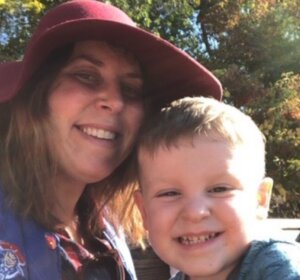08 Sep The Language of Resilience

In this edition of The Microscope, we share a piece written by SUDC mother, Lillian Ardell Stevens, in memory of her son Aidan. It was originally published on her blog (https://languagematters.org/blog).
Pre-script: This is a personal essay about my journey with grief and how I came to understand sudden loss and change through the lens of psycholinguistics. The goal is to share my insights as a parent and an applied linguist in the hopes that my essay helps the reader come to terms with the sustained life-in-isolation that is required of us to live responsibly during the global pandemic. My hope is you will treat this essay (and its author) with kindness and grace for discussing a deeply personal topic in public.
That morning, the sky was clear and crisp. I remembered thinking it felt like the 9/11 sky: nature mocking the horrible events of the day. Is it cruelty or nature’s way of reminding us that there’s beauty in pain? A clear, crisp October morning and my almost-three year old son, the first born with a sister on the way, was found supine and ice-cold in his bed. I’m glad not to remember particulars of the next hour, though there are brief flashes. The failed resuscitation, the short ambulance ride to SUNY Downstate, and hearing the EMT yelling “DOA” as they rushed my sweet boy into an ER room. My body knew it was over before my brain did; that is nature’s way. Turns out all of this was nature’s way and, according to the Stoic Marcus Aurelius, I am to live as it (nature) requires.
When the doctor called it, a mantra bubbled up from my gut. “My son is dead, my son is dead,” the words rang clear and true, the bell toll of death sounding the alarm in my consciousness, my body forcing my brain to acknowledge the incomprehensible. The awareness washed over my body: this is trauma, something that stings but will soften over time, and my sole purpose for now is to accept this new Aidanless world. I’d read Bessel Van Der Kolk’s work on embodied trauma and I knew that unabashed acceptance was the only way I’d survive his loss if I were ever to feel whole again.
The morning of The Horror I was faced with untenable truths of existentialism accompanied by a resounding awareness of how little control we actually exercise over the events that occur in our lives.
This fact (lack of control) left me psychologically flat-footed. Well, not exactly. Later that morning after the umpteenth person attempted to comfort me with an, “I’m so sorry,” I shot back at them, “That’s deficit language, and my son was a blessing. No more sorries, instead come to me with ‘I love you’s’.” As it happens, my gut instinct as an applied linguist activated to guide my shattered heart and reeling mind to accept people’s compassion, so long as they delivered the messages in affirming words and phrases. In light of my small epiphany that day, I wish to share the following insight about what we can control, dear reader: when we change our language, we can change our mind. This is how I understood living “as nature requires it”, and it’s the wisdom I wish to share with you as we collectively grieve a lifestyle lost to quarantine and to the omnipresent fear of succumbing to CoVID-19.
To be clear, that fear is real and it’s pervasive. For what happens “out there” in the world has a direct impact on what goes on “in here” e.g: in your home, your brain, your body. This assumption is guided by the principles of sociocultural theory, which states that context influences human behavior. For example, when something big happens in our culture (from 9/11 to the #MeToo movement), particular Discourses (societal narratives) float around the mouths of newscasters, social influencers and even your drunk Uncle at Passover seder. As we remain sequestered in our homes and tethered to our screens, our news feeds bombard us with the language of fear, unimaginable stress, death tolls, partisan bickering, unprecedented economic distress and an uncertain timeline of recovery. Some of these narratives are constructed “out there”, but the effects of the virus are very real and pernicious. (It goes without saying if CoVID has directly affected you, then nothing else matters right now as you pivot into survival mode…)
What I’m saying is the weight of societal Discourse can amplify your perception of life-in-quarantine to the point of extreme emotional duress.
What I’ve learned from the morning of The Horror is that deficit rhetoric amplifies our natural reaction to life being turned upside down. You can choose to lean into the depression, the trembling voice in your head taunting you that life as you knew it is forever changed. Lean into that strong desire to cloak yourself in memories (your 2019 photo library beckoning for one more scroll), a break-in-reality that might delay your ability to come to terms with this “new normal”. Just like my son is forever six feet underground, we will only ever exist in a post-coronavirus world. As I see it, the only way forward is to adjust how we frame this mess, something we can do by minding our modals.
A brief treatise on the function of modal verbs. These words (should, could, may, must, can) express evaluation and obligation in the language system. There’s a sneaky moral undertone when an authority compels you to act against your (supposed) free will. Consider a whiny toddler, turning to his parents, “Do I have to clean up my toys?” In the recesses of our mind where our tiny voice lives, the presence of modal verbs can swiftly lob criticisms your way: “you shouldn’t have that piece of cake, you promised you’d be good around sweets.” The comparison-cycle is another classic bit of cognitive tomfoolery, “If only my partner realized how hard I have it…” etcetera.
Modal verbs reflect the self-evaluative space in our brain. Our attitudes tend to create a “poor me” mentality without us ever realizing it. Turns out we are hard-wired to put our needs first, that’s how the ego works. David Foster Wallace stated the obviousness of this concept: “Think about it: there is no experience you’ve had that you were not at the absolute center of.” Try and recognize this inescapable fact of our humanity by paying attention to how quickly the feelings of obligation pile on, expressed in “have tos” and “need tos” as you tend to any and all of the pressure points that amass throughout your waking life. The goal is to recognize, not judge(!), the ego at work. The simplest way is to listen for the modals.
Think about it: there is no experience you have had that you were not at the absolute center of.
Astonishingly, there is a linguistic solution to change your mind and take control of your ego: replace the “have to’s” with “get to’s”. Getting to do things in your life manifests the agency and choice that is always available to you as a human. In spite of the pressures we feel that are at once true and pervasive, we remain the authors of our own stories. Such a softening of your attitudinal mindset, if practiced diligently and over time, can dismantle the ego-driven part of our subconsciousness in pursuit of a softer, selfless way of looking at the world. This is my theory of growth, and it’s how I moved away from self-pity statements (truly deficit rhetoric) “how could this happen to me?” over to, “at least I got to be his mommy.”
Since I couldn’t control or even predict what happened to Aidan, I needed the grace and self-compassion to re-frame how I understood the situation unfolding around me. By adding “get tos” to my internal monologue, by paying careful attention to when instances of self-pity dominate my thought cycles, I am able to move through them to arrive at a place of agency and positive self-regard. In this way, I get to author my own story of resilience.
Lillian Ardell Stevens, Ph.D. is a linguist, teacher, researcher, mentor and mother. She is the Founder of Language Matters, a boutique educational consulting firm that focuses on bringing theory to practice in areas of academic literacies, language attitudes, linguistic awareness and bilingual learning. Lilly lost her son Aidan in 2019.


